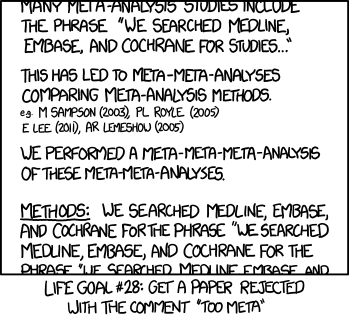Capitalism bitch!
I’m reminded of the scientist paid for by big tobacco in Thank You for Smoking…
Just ask the carnivore diet lemmy.
Reporting in!
The observational weak relative risk studies can be pumped out infinitely, they do not inform on cause and effect sadly. The best data we have of prewesternized cultures eating meat heavy diets shows no incidence of cancer in these populations (first tribe nomads, inuit, etc). Humans have been eating meat for at least 2.5 million years, yet cancer has only jumped up to the epidemic it is today in the last 150 years. Something in the environment and diet has changed, absolutely. What is the causative factor? The anti-meat papers with weak relative risk tells me that its not the meat, we should be looking for a very strong signal (50% of people born today will have cancer in their lifetimes - 150 years ago basically nobody got cancer).
I could speculate, and I have my own theories, but we are looking for a significant change in the last 150 years as our culprit. Meat is not a new invention. Processed food, fructose, sugar, industrial food oils, pesticides in the food supply - all have bloomed in the last 150 years, I would hazard a guess and say these are the real harbingers of modern disease we need to focus on. Curiously these epidemiological food questionnaire papers don’t look at these factors, maybe because its hard to fill in a survey for sugar (its in all processed food).
Sorry since when did the monkeys before us got atherosclerosis? They were dead before the diet came into effect. We live much longer, where we need to keep the plaque development much lower than they had. And don’t tell me that your butter steak doest cause a rise in LDL if baseline LDL is <80 or that high LDL is not causal to atherosclerosis.
LDL is not a disease, its necessary for human life. Damaged (Oxidated, and Glycated) LDL is a indicator of significant cardiovascular problem, but undamaged LDL is not a disease. If someone has elevated LDL and they are not eating a sugar heavy diet, they should get plaque imaging to see what their actual atherosclerotic risk is.
Even if it wasn’t an unhealthy diet it is egoistic as fuck.
Why is a eating pattern egoistic?
Because its take huge amounts of land and is cruel to animals.
eating meat isn’t cruel
Killing animals without need seems cruel enough to me. You are honestly going to tell me we treat animals the way they deserve? Especially on affordable meat?
first of all, I don’t kill animals, except pests or by accident.
second, how can animals deserve… anything?
Humans have been eating meat for at least 2.5 million years, yet cancer has only jumped up to the epidemic it is today in the last 150 years. Something in the environment and diet has changed, absolutely. What is the causative factor? The anti-meat papers with weak relative risk tells me that its not the meat, we should be looking for a very strong signal (50% of people born today will have cancer in their lifetimes - 150 years ago basically nobody got cancer).
Life expectancy in 1875 in the USA was 39.41 years. The vast majority of cancers will not cause significant illness (or show up at all) in population groups that die of other disease/injuries before 40 - so, handwaving away the studied correlative links with cancer in population groups today that eat a lot of meat just because ‘people ate red meat 150 years ago and they didn’t get cancer’ is what scientists call ‘illogical’.
And that’s completely ignoring the fact that we have far advanced medical technology in the last 150 years so we are actually diagnosing more cancers because we’re finding them when they are smaller and more treatable (that’s a good thing).
Life expectancy in 1875 in the USA was 39.41 years.
This is true, but this is the mean. This includes everybody who dies in childhood. If you made it to 10 years old you are likely to live until 60.
https://www.infoplease.com/us/health-statistics/life-expectancy-age-1850-2011
This is exactly why the office of the President requires a minimum age of 35. It wasn’t because they were going to die in 4 years, it was because they had the expectation they had lived for a lot longer.
Why would we rule out all the kids under 10 from the life expectancy stat? To skew it older just to make it seem like people lived longer back in 1875? We don’t do that with life expectancy stats now, the life expectancy for 2020 is 78.81 and yes that includes anyone unfortunate enough to die as a child or infant. It also doesn’t mean that anyone who is 74 will be dead in ~4 years, it’s an average - which is helpful when talking about large demographics (which we are).
Wtf does the president have to do with anything lol. They only pick presidents over 35 “because they had the expectation they had lived for a lot longer”. So… They expect that people who are older than 35 have lived longer than those who are under 35? Um yes that is how the passage of time works.
I’m not sure how this helps the discussion.
The value of seeing how long adults live tells us alot about our history. If we know historically adults could live into old age we can learn about disease progression over historical records as well as from archaeological bone surveys.
Ain’t that a surprise. Studies on the effects sugary drinks have on your health backed by Coca Cola are also funny
And this is yet another reason why we need independent science funding, kids
Science has been canceled until 2028
Found the American.
True, but also want to emphasize that this has worldwide implications, the NIH is a major contributor to clinical research. Probably more harmful if it produces garbage data than less data
Independent of whom/what?
Seriously? Independent from anything and anyone that has an interest in the results going any specific way. How is that not obvious?
- Industry
- Politics
- Excessive earmarking
- Your mom
Ok, now do coffee.
I haven’t seen a lot, health-wise, that suggests coffee is detrimental. Environmentally it’s a harder sell every year with climate change and the number of coffee drinkers still yet to peak, but the economics will counter that soon enough.
i read an old study that caffiene, had a affect against blood sugar, probably due to its diuretic effects.
No shit sherlock.
A study of studies? That’s interesting. I wonder how often that happens? I should do a study about it. A study of studies about studies.
A review of studies is a meta-analysis. What you’re describing is a meta-meta-analysis, which is also a thing! Here’s one I found from a cursory search..

Alt text: Life goal #29 is to get enough of them rejected that I can publish a comparative analysis of the rejection letters.
It also depends on the tone of the social media site discussing it.
I’m gonna eat it no matter the results because it’s delicious.
The issue with many of these studies is that they compare people who eat red meat to those who either avoid it specifically or don’t eat meat at all. The problem is, red meat isn’t the only variable at play. Vegans and vegetarians, in particular, are likely to have much healthier lifestyles overall than someone who eats red meat - which is more or less synonymous with the “average person.”
What I’d really like to know is the difference between red meat eaters with healthy lifestyles, compared to both the average person and those who don’t eat meat at all.
Most of the studies include processed meat like salami, which has known carcinogens and conflates the result to all red meat.
This particular linked study, that is the basis for this thread, limited itself to only unprocessed red meat.
Except that salami is typically made of pork, which isn’t a red meat. Most cured meats and sausages are pork based.
Nutritionally speaking pork is a red meat. All mammal meat is red meat, non mammal meat is not.
Just checked and you are right. I’m so used to hearing “Pork, the other white meat” that I mis-understood.
Yeah it was very clever marketing on their part. Don’t blame you.
Next you’ll tell me that cat’s aren’t white meat either…

Every study conflates high sugar consumption with meat consumption. If a pizza is considered a serving of meat, in all fairness it should also be considered a serving of plant based foods. Carbohydrates make up the bulk of pizza. And those come exclusively from plants
We know sugar is bad for health. These observational studies are useless unless they can control for sugar and carbohydrate intake as a factor.
unless they can control for sugar and carbohydrate intake as a factor.
But they can, lol
Oh that is great news, can you point me at that epidemical study?
That may be a problem, but it wouldn’t explain the differences in results due to sponsorships.
Well, it would - in the sense that an unbiased study might still find that a meat-eater (i.e. the average person) is less healthy than someone who doesn’t eat meat, and then falsely conclude that meat is the reason, rather than accounting for all the other lifestyle differences. Meanwhile, a study funded by Big Meat would obviously find that meat is good for you - which, let’s not forget, could also be true.

The left/blue side of the graph are outcomes that show meat decreased all cause mortality, the right/red side of the graph are outcomes that show meat increases all cause mortality. If you were a hungry researcher, you could publish unending papers indicating either way from this same observational data pool! - Hence the constant news cycle driven by dietary agendas - not based on hard science RCTs.
The problem with open-ended observational studies, is you can’t prove causation, and you can find tons of associations for or against whatever you like.
Grilling the data: application of specification curve analysis to red meat and all-cause mortality
when investigators analyze data from observational studies, there are often hundreds of equally justifiable ways of analyzing the data, each of which may produce results that vary in direction, magnitude, and statistical significance
Evidence shows that investigators’ prior beliefs and expectations influence their results [5]. In the presence of strong opinions, investigators’ beliefs and expectations may shape the literature to the detriment of empirical evidence
Then somebody will come along and do a metanalysis of the studies that were just basically association farming. And claim to find some universal truth… at a certain point we have to look at these observational studies as not science, hell it’s not even academics, it’s advertising, propaganda, and agenda pushing. These are hypothesis generating, they should be the beginning of science, they are not the conclusion of science. And they should never be used for policies, or even marketed to lay people.
Not to mention most of the antimeat studies are observational food surveys with weak hazard ratio outcomes.
Most annoyingly the classification of “meat” is infuriating and biased. In some of the studies any sandwich, any pizza, any sugar covered possible meat containing item counts as meat. It’s well established that sugar is very detrimental for health.
The only people avoiding sugar at large care about their health, so there is tremendous healthy user bias, and the advice for the last 50 years or so has been to avoid meat if you want to be healthy… Reinforcing the healthy user bias.
A high quality disciplined study to show the effect of meat on health would include metabolic markers like ketones, track sugar independently, and not use a once every 4 year food questionnaire.
The key to knowing if the study is serious, or sensational, is if they use relative risk or absolute risk in their findings. Nobody publishes absolute risk with respect to meat consumption…
If there was a study, I would volunteer. I’m an omnivore now for 20 years, after being vegetarian for about the same amount of time, never vegan. I live a reasonably healthy lifestyle but office job and do like to drink about thrice a week, only one drink (so moderate, I think) . I’m sure there are lifestyle matched vegetarians and vegans.
Personally I’m healthier but heavier (was underweight, now middle of healthy BMI which feels fat to me but I do literally feel good) with some meat in the diet but don’t eat it every day. Cholesterol was high when I was vegetarian, still is. Only thing that drops that is regular fasting, which unfortunately was a reliable migraine trigger for me.
Did you read how any of the referenced studies were structured to confirm this assumption?
Would you be able to give examples of healthier behaviors that vegans and vegetarians perform that the general population does not?
If one made their choice to abstain from meat for ethical reasons and not health reasons I’m not sure their lifestyle would be drastically different from their counterparts, then again I’m not sure what particular behavior patterns you are referring to which could throw off studies.
I abstain from meat for ethical reasons, a similar ethical reason encourages me to use public transit and bike instead of driving, to reduce my impact on life and the environment. This is anecdotal but most vegans/vegetarians I’ve known are concerned with their impact in general, it’s rare that they only obstain from eating meat but do everything else as an average US meat-eated would.
On average, there are far more people among vegetarians and vegans who generally pay more attention to what they eat and don’t eat, exercise more, and likely smoke and drink alcohol less as well. Obviously, there are exceptions - but I’m talking about averages here.
since vegan fare is pretty limited, i think the first thing is that vegans don’t eat nearly as much fast food. they probably eat out less overall. which is going to require a lifestyle that carves out time at home to cook or meal prep.
Maybe the restaurants you go to have fewer options, but vegans go to restaurants that have things they can eat, and practically every restaurant has options now. French fries, for example, are a fast food item that’s usually vegan.
so you think vegans eat as much fast food as non vegans
You do realize you’re not obligated to respond to comments, right? If you don’t know what you’re talking about, you’re allowed, encouraged even, to not respond.
am i wrong?
Yes. A number of vegans excel at endurance sports and they do that be eating and drinking boatloads of calories.
what did say that contradicted this
Strange that YTubers have to announce if they’re a sponsored video but sponsored scientists don’t.
Read the end of any research paper and it indicates any possible conflicts of interest. Youtube isn’t a reliable source.
They usually disclose their funding in the journal article. Otherwise, this meta analysis wouldn’t be possible.
In other news, it has been found that water, is indeed, wet.
Ah, I get it now. Thank you for the simple break down. I think we can all comfortably agree that meat is now…met.
There is no such thing as an impartial sponsor; some are more obviously biased than others, but the belief in a fictitious impartiality is part of the problem. It shouldn’t take a meta-study for people to see am obvious conflict of interest.
I’m biased. You are biased. Everyone is biased.
Hi, please, don’t. These baseless “corrections” that are really just semantics aren’t helping anyone, and just contribute to anti-intellectualism.
We know what an impartial sponsor is in the context of this study - it’s a sponsor that doesn’t have a profit motive.
Obviously humans are biased. Scientists know that. Scientists train on that concept from day one. Observational studies are hard to control for bias, but that doesn’t mean the field of science is silly for trying anyway.
The placebo-controlled double-blind study is the gold standard of scientific experiment for a reason.
An impartial sponsor is not a sponsor that is inhuman and has no preconceptions. We all know that’s impossible.
An impartial sponsor is one that does not have clear signs of partiality - like a literal profit motive. That’s all.
Edit - and for the record, in science, everything requires study. If you want to claim that conflicts of interest are impacting scientific results, you study it.
That’s what it means to be impartial. To not trust assumptions based on your preconceptions. Assume as little as possible, consider as many possible explanations as you can, and verify everything.
What if the sponsor is the blanket university funding for a professor’s research? It may have some bias, but there is no steak in the actual result.
I expect to see “these results call for more research on the topic”, but that’s pretty much it.
steak
stake?
Accepting funding from sponsors responsible for pollution & publishing environmental toxicology studies that disfavor those sponsors was pretty common at the university medical office where I worked.
“I just take scientists out and give them a bunch of funding for their research, and they always give me the results I want. Now of course they could always say no, but they won’t because of the implication. You know, that if they produced results that disagreed with me, that I would refuse to fund future studies. Of course I would never do that, but they don’t know that. So they give positive results for me. You know, because of the implication.”
It’s this comment that made me realize that Dennis is the human embodiment of our capitalistic system











